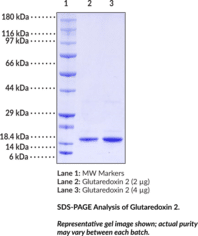Territorial Availability: Available through Bertin Technologies only in France
- Correlated keywords
- Grx-2 2a 2b 2c GLRX Escherichia
- Product Overview:
Glutaredoxin 2 (Grx2) is a thiol-disulfide oxidoreductase and member of the thioredoxin family encoded by GLRX2 with a role in the maintenance of cellular thiol redox homeostasis.{53968,53969} Alternative splicing of GLRX2 produces three ubiquitously expressed isoforms, Grx2a, Grx2b, and Grx2c, with Grx2a localized to the mitochondria and Grx2b and Grx2c in the cytoplasm and nucleus. It is a dithiol Grx that contains two active site cysteine residues and catalyzes the glutathione-dependent reduction of disulfides, acting as an electron donor for ribonucleotide or sulfate reduction, and regulating protein levels of glutathione mixed disulfides.{53969} In its inactive state, Grx2 is homodimer linked by a single [2Fe-2S] cluster, which acts as a redox sensor that drives monomerization and activation of Grx2 under conditions of oxidative stress, such as free radical formation or oxidation of the glutathione (GSH) pool.{53969,53970,53971} The oxidized active site in Grx2 is reduced by GSH and, unlike other eukaryotic Grxs, is also a substrate for thioredoxin reductase (TrxR). Grx2 catalyzes the reversible glutathionylation of mitochondrial complex I to regulate superoxide production and facilitates the reduction of protein disulfides, glutathionylated proteins, and other low molecular weight substrates under conditions of oxidative stress.{57138} Knockdown or overexpression of GLRX2 enhances and reduces, respectively, oxidative stress-induced apoptosis in HeLa cells. Glrx2 knockdown increases high-fat diet-induced insulin resistance, hippocampal inflammation, increases in body weight, and cognitive dysfunction in mice.{53972} Cayman’s Glutaredoxin 2 (human, recombinant) protein can be used for enzyme activity assay and Western blot (WB) applications.
Cayman Chemical’s mission is to help make research possible by supplying scientists worldwide with the basic research tools necessary for advancing human and animal health. Our utmost commitment to healthcare researchers is to offer the highest quality products with an affordable pricing policy.
Our scientists are experts in the synthesis, purification, and characterization of biochemicals ranging from small drug-like heterocycles to complex biolipids, fatty acids, and many others. We are also highly skilled in all aspects of assay and antibody development, protein expression, crystallization, and structure determination.
Over the past thirty years, Cayman developed a deep knowledge base in lipid biochemistry, including research involving the arachidonic acid cascade, inositol phosphates, and cannabinoids. This knowledge enabled the production of reagents of exceptional quality for cancer, oxidative injury, epigenetics, neuroscience, inflammation, metabolism, and many additional lines of research.
Our organic and analytical chemists specialize in the rapid development of manufacturing processes and analytical methods to carry out clinical and commercial GMP-API production. Pre-clinical drug discovery efforts are currently underway in the areas of bone restoration and repair, muscular dystrophy, oncology, and inflammation. A separate group of Ph.D.-level scientists are dedicated to offering Hit-to-Lead Discovery and Profiling Services for epigenetic targets. Our knowledgeable chemists can be contracted to perform complete sample analysis for analytes measured by the majority of our assays. We also offer a wide range of analytical services using LC-MS/MS, HPLC, GC, and many other techniques.
Accreditations
ISO/IEC 17025:2005
ISO Guide 34:2009
Cayman is a leader in the field of emerging drugs of abuse, providing high-purity Schedule I-V Controlled Substances to federally-licensed laboratories and qualified academic research institutions for forensic analyses. We are certified by ACLASS Accreditation Services with dual accreditation to ISO/IEC 17025:2005 and ISO Guide 34:2009.





